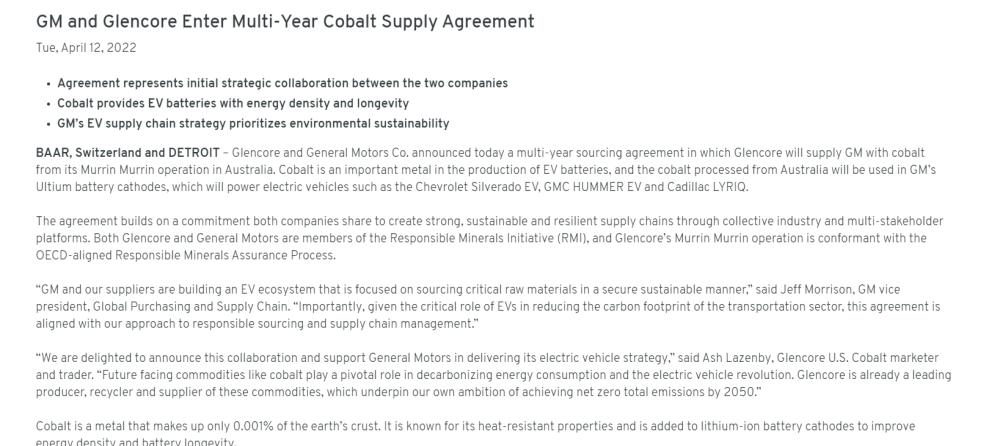Financial Associated Press (Shanghai, editor Shi Zhengcheng) news, as the global car companies in unison to electrification as a transformation direction, as soon as possible to lock in the next few decades of key battery material production capacity has become the number one priority of the automotive industry giants.
According to GM in the United States on Tuesday, the company has signed a "multi-year" cobalt supply agreement with mining giant Glencore, although the company did not disclose the specific scale of raw materials targeted.

(Source: Company's official website)
As a rare metal, the average content of cobalt in the earth's crust is only 0.01%, and the main role in the battery is to ensure that the cathode is not prone to overheating or catching fire, which helps to extend the battery life. Generally speaking, new energy vehicle manufacturers will provide an 8-10 year warranty for batteries.
GM said the cobalt locked in in the agreement comes from Glencore Australia's Murrin Murrin nickel-cobalt mine and will be used in the company's Ultium battery cathode, which will be used in GM's electric vehicles such as Chevrolet Sorod, GMC Hummer, Cadillac LYRIQ and so on.
Obviously, electric vehicle batteries need more than just cobalt, in order to ensure that by the end of 2025 in North America can produce a million electric vehicles, GM has signed supply agreements with a number of raw material companies, and even included building its own joint venture battery factory.
At present, GM and POHANG Chemical have decided to establish a joint venture plant in Quebec, Canada to produce cathode active materials, and signed a purchase agreement for lithium resources with the California geothermal lithium extraction company CTR, and the rare earth materials part cooperates with GE to create an industrial chain, and also locks in the alloy flakes and rare earth magnet production capacity of MP materials.
It is worth mentioning that just when GM is in full swing to lock in the production capacity of battery materials, other manufacturers are obviously not idle, especially Tesla, which is regarded by GM as surpassing the target.
The giants are looking for production capacity and even considering mining themselves
According to Rystad Energy's macro forecast at the end of last year, the global demand for industrial metals for electric vehicles and energy storage batteries will grow in a spurt in the coming years. Taking lithium, which Chinese investors are most familiar with, for example, Rystad expects demand to soar 20 times between 2020 and 2030, as does cobalt and nickel.
(Demand for raw materials for some electric vehicle batteries is expected, source: Rystad Energy, Dow Jones)
Therefore, the traditional car companies that shout out the goal of producing millions of electric vehicles per year have become the only choice to take the initiative to find minerals.
For example, Tesla, the leader of electric vehicles, has signed lithium concentrate purchase agreements with Piedmont, Liontown, and Core, and in terms of nickel resource reserves, Tesla has also finalized long-term supply agreements for mining companies such as BHP Billiton, Vale, and Talon Metals.
European auto giant Volkswagen Group has also finalized the policy of establishing an automotive battery factory and directly purchasing raw materials early, and recently signed memorandums of understanding with China's Huayou Cobalt and Tsingshan Group to lock in nickel and cobalt supplies from Asia.
Coupled with the original strong demand for raw materials in battery factories such as Ningde Era, LG New Energy, Northvolt, etc., the increasingly inward-volume snapping market has forced car companies to start looking for other channels, such as their own investment in mining.
Musk, who just welcomed the Texas plant into operation at the end of last week, said on social media that the current lithium price has reached the point of madness, and Tesla may have to enter the field of large-scale mining and refining. The world's richest man also stressed that there is no shortage of lithium in the world at present, and the problem is that the speed of mining and refining cannot keep up.
(Source: Social Media)